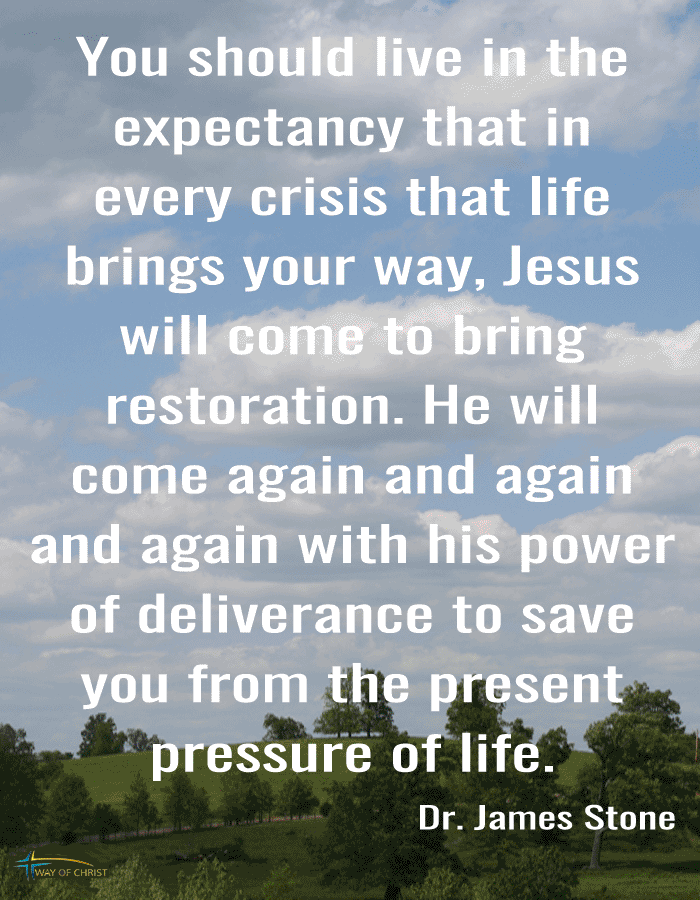The coming of Christ is probably the most dominant theme in the New Testament, especially if importance is measured by the number of times a subject is mentioned.

A human being is a creature of two different worlds. He is a flesh and blood body that has been quickened by the breath of life, the Spirit of God. Since the body is inanimate material, it has to be infused with life by a force outside of itself. The spiritual has to penetrate the physical before life can be experienced by that which has no life.
From the planting of a seed to the coming forth of the kingdom of God among men, the miracle of this life is consistent in how it occurs. The outward husk of the seed must be destroyed before the essence of new life within can come forth in its glory. The kingdoms of men, as in the interpretation of Nebuchadnezzar’s dream (Daniel 2), must be broken into pieces before the means of their annihilation (the coming of Christ) spreads forth in a great nation of God filling the whole earth. The coming forth of the miracle of life within the created world always comes forth in the labor pains of physical death–the dying to something in the earthly domain.
Coming of Christ in your life is a Day of the Lord.
This moment of time, when the essence of the Spirit breaks forth out of the flesh, came to be known in the prophecies of the Old Testament and the teachings of the New Testament as the “Day of the Lord.” It was a special time; a special day when God’s will and purpose in the created world would be fulfilled. It is how God continually manifests his presence in the created world.
It is not only the process of the new life for the individual, but it is also the way by which God brings about his will and purpose in the world as a whole. As in Daniel’s interpretation of the dream of the king of Babylon, it always has both judgment for the physical world and restoration of the spiritual realm. It is the death of the outward husk of the seed that enables the spirit of life within the seed to break forth in newness of life. It always depicts the end of a present age and the coming of a new age.
Coming of Christ is predicted by Old Testament prophets.
The prophet Amos was probably the first to use the phrase, the “Day of the Lord:”
Woe unto you that desire the day of the LORD! to what end is it for you? the day of the LORD is darkness, and not light. As if a man did flee from a lion, and a bear met him; or went into the house, and leaned his hand on the wall, and a serpent bit him. Shall not the day of the LORD be darkness, and not light? even very dark, and no brightness in it” (Amos 5:18-20)?
Amos is speaking of the judgmental aspect of this special time of God that eventually would bring restoration. The physical world of man’s existence must come down.
The prophet Joel gave both the judgment and the restoration of the day of the Lord. The Lord spoke through Joel and said,
Ye shall know that I am in the midst of Israel, and that I am the LORD your God, and none else . . . I will shew wonders in the heavens and in the earth, blood, and fire, and pillars of smoke. The sun shall be turned into darkness, and the moon into blood, before the great and the terrible day of the LORD come. And it shall come to pass, that whosoever shall call on the name of the LORD shall be delivered: for in mount Zion and in Jerusalem shall be deliverance, as the LORD hath said, and in the remnant whom the LORD shall call. (Joel 2:30-32)
Those who would call on the name of the Lord in the midst of this judgment and be restored to newness of life, would do so because the Lord said, “I will pour out my Spirit upon all flesh; and your sons and your daughters shall prophesy, your old men shall dream dreams, your young men shall see visions: And also upon the servants and upon the handmaids in those days will I pour out my spirit” (Acts 2:28,29). The Lord further promised the restored remnant, “ye shall eat in plenty, and be satisfied, and praise the name of the LORD your God, that hath dealt wondrously with you . . . And ye shall know that I am in the midst of Israel, and that I am the LORD your God, and none else: and my people shall never be ashamed” (Joel 2:26,27).
Coming of Christ is in every book of the New Testament
With Peter quoting the prophecy of Joel to explain what was happening to the followers of Jesus on the Jewish feast day of Pentecost, he understood that out of the judgment of the nation of Israel was coming a new nation. The present age of the physical nation of God was giving birth to a new age. The power, the glory, and the honor of the new kingdom of God were being experienced. By the Holy Spirit, this new nation was being infused with the life of God, Jesus Christ, the “Day of the Lord.”
A few hours before his death, Jesus told his disciples that he was going to have to leave them. Then, He said, “I will come again” (John 14:3). When Jesus was taken up into the heavens by the Father, two men in white apparel told the disciples who were witnessing the ascension, “Ye men of Galilee, why stand ye gazing up into heaven? this same Jesus, which is taken up from you into heaven, shall come again in like manner as ye have seen him go into heaven” (Acts 1:11). The Father took him up and the Father will send him back.
The coming of Christ is probably the most dominant theme in the New Testament, especially if importance is measured by the number of times a subject is mentioned. The return of Jesus is referred to over 300 times. The expectancy of the coming of Christ is found in every letter and book of the New Testament.
Peter wrote, “That the trial of your faith, being much more precious than of gold that perisheth, though it be tried with fire, might be found unto praise and honour and glory at the appearing of Jesus Christ” (1 Pet. 1:7). James inscribed, “Be ye also patient; stablish your hearts: for the coming of the Lord draweth nigh” (James 5:8). Paul recorded, “And the very God of peace sanctify you wholly; and I pray God your whole spirit and soul and body be preserved blameless unto the coming of our Lord Jesus Christ” (1 Thess. 5:23). John penned, “And now, little children, abide in him; that, when he shall appear, we may have confidence, and not be ashamed before him at his coming” (1 John 2:28). Jude communicated, “Behold, the Lord cometh with ten thousands of his saints” (Jude 14). Finally, the Bible closes it record with, “Even so, come, Lord Jesus” (Rev. 22.20).
Jesus Himself talked of his return: “I go to prepare a place for you. And if I go and prepare a place for you, I will come again, and receive you unto myself; that where I am, there ye may be also” (John 14:2,3). He added, “I will not leave you comfortless: I will come to you” (John 14:18). Finally, He stated, “Ye have heard how I said unto you, I go away, and come again unto you” (John 14:28).
Coming of Christ is revealed by three different keys words in the New Testament.
There are three keys words that were used by the early followers of Jesus when they talked of the coming of Christ. The most dominant of the three words is usually translated coming. Surprisingly, it is not translated from the word meaning, “to come” or “to go,” as if you are in one place and need to go to another place. The key word that is most often used to translate the “coming of Christ” means, “a being near.” The King James Version translates the original word as “coming” and “presence.” The coming of Christ is to experience the nearness or presence of Christ.
The second most often used word in the “coming of Christ” is translated from the word meaning, disclosure. The root of this word means, “to take off the cover, i.e. disclose.” It is translated by the King James Version as “appearing,” “coming,” “lighten,” “manifestation,” “be revealed,” and “revelation.” The coming of Christ is the disclosure of Christ. The original word is where we get our word apocalypse. The revelation of Jesus Christ came to be understood in the apocalyptic events of the destruction of the present evil age to usher in the future good new age–the Day of the Lord. Thus, the last book of the New Testament is the Revelation of Jesus Christ–the apocalypse of Jesus Christ.
The third word used in the “coming of Christ” is translated from a word meaning, a manifestation. It is translated by the King James Version as “appearing” and “brightness.” Paul wrote, “then shall that Wicked be revealed, whom the Lord shall consume with the spirit of his mouth, and shall destroy with the brightness of his coming” (2 Thess. 2:8). Wickedness is always “rendered entirely useless” (meaning of destroyed) with the manifestation of his presence, or the brightness of his coming.
Coming of Christ is promised by Jesus in his return to his disciples.
The early followers knew that Jesus had promised that He would return to them. He had said, “I will not leave you comfortless; I will come to you.” They believed that Jesus had not only returned to them by the Holy Spirit on the Jewish Feast of Pentecost, but they also believed that the revelation of His presence would be manifested every time the present condition of life needed to be brought to an end and a new beginning experienced. They knew Jesus would come into their world and save them. They lived their lives in the expectancy of the coming of Christ.
For example, when Paul was in Athens because he had been forced to leave Thessalonica by envious nonbelievers, he wrote back to the Thessalonians disciples and raised a penetrating question (1 Thess. 2:19,20). In the midst of persecution and affliction (an apocalyptic event), he ask them, “what is our hope, or joy, or crown of rejoicing?” He answered the question for them: “Are not even ye in the presence of our Lord Jesus Christ at his coming?” Then, simply stated, “For ye are our glory and joy.”
Experiencing the manifestation of Jesus Christ in their relationship, the nearness of Christ had produced such glory that in the midst of the afflictions Paul was experiencing hope and joy. Is it any wonder then that the early followers continually lived in the expectancy of Jesus–the coming of Christ? It was their hope.
You, too, should live in the expectancy that in every crisis that life brings your way, Jesus will come to bring restoration. As the old is being brought to its end, the new will be ushered in by the coming of Christ. This is the eternal hope of every believer in Christ. Jesus will come again and again with His power of deliverance to save us from the present pressure of life.






